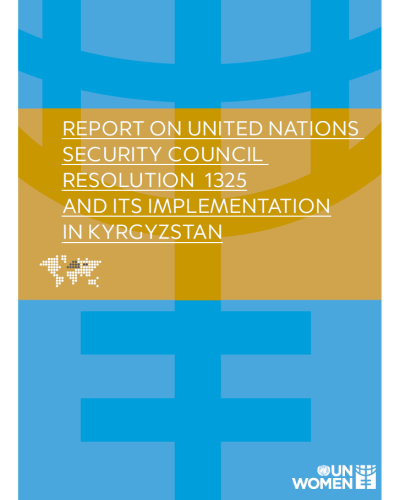Report on United Nations Security Council Resolution 1325 and Its Implementation in Kyrgyzstan

In 2000, the United Nations Security Council passed landmark Resolution 1325 on Women, Peace and Security (UNSCR 1325 on WPS).1 This resolution has helped create greater awareness of the relevance of gender to the field of peace and security and has placed women’s rights firmly on the peacebuilding agenda. The document addresses how girls and women are impacted by conflict and war and recognizes the equal and important role that they play in forging a lasting peace.
Since the adoption of the resolution, many countries have adopted National Action Plans (NAP) to implement UNSCR 1325 and development actors have continued advocating for a gender perspective in peacebuilding through various programmes.
In 2010, during the 10-year commemoration of the UNSCR 1325, the UN Secretary-General was requested to develop a report on women’s participation in peacebuilding. PBSO worked with UNIFEM to develop the report and the Seven-Point Action Plan (7PAP) on Gender-Responsive Peacebuilding.2 UN system committed to improving its accountability to women and girls by adopting 7PAP. This detailed blueprint includes concrete “commitments” relating to (1) conflict resolution, (2) post-conflict planning, (3) peacebuilding funding, (4) civilian capacity, (5) governance, (6) the rule of law, and (7) economic recovery.
Since the adoption of UNSCR 1325, Kyrgyzstan has developed three NAPs on UNSCR 1325: NAP 2012-2014 (extended to 2015) and NAP 2016-2017 were implemented and NAP 2018-2020 is being implemented now. The Government plans to develop another new NAP for 2021-2023.
This report aims to produce an analysis of UNSCR 1325 and its implementation in Kyrgyzstan. More specifically, the paper provides an overview of all NAPs 1325 in Kyrgyzstan, consolidates analysis on the progress made and gaps identified, and summarizes recommendations to inform the next NAP on UNSCR 1325 in Kyrgyzstan. The analysis is mainly made based on available monitoring reports on NAP implementation and supported by other available resources and practices around the WPS agenda.




